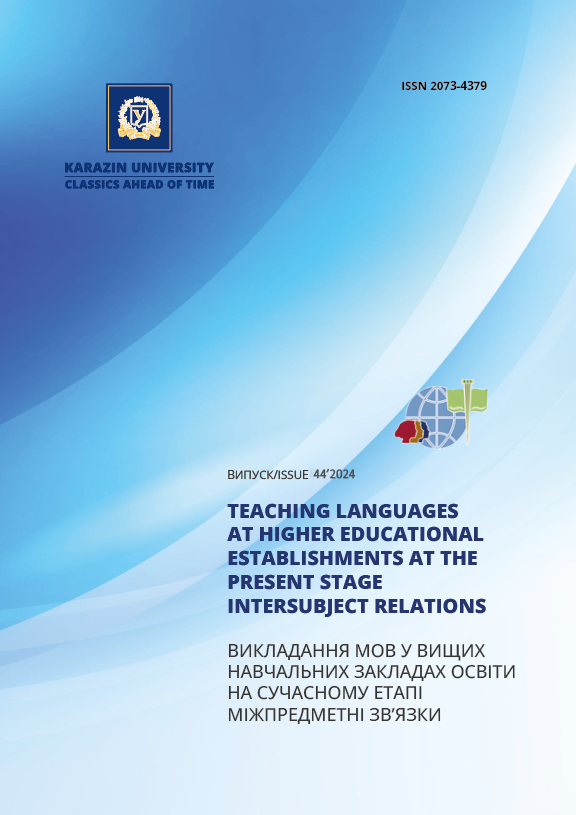Professional context of teaching reading to foreign economics students
Abstract
The article continues a series of studies dedicated to teaching Ukrainian-language reading skills to foreign students specializing in economics. It underscores the significance of achieving communicative objectives in education to ensure that foreign students in higher education comprehend their specialty and various forms of Ukrainian-language communication. However, the initial level of text comprehension among students at the onset of the main stage of learning is insufficient to effectively support the educational process in Ukrainian higher education institutions within their chosen specialties.
The article emphasizes the pivotal role of reading in fostering foreign language communicative competence. Reading, as a fundamental educational skill, serves as the cornerstone for the development of all other language skills. The training in reading for economics students necessitates specification, systematization, and the exploration of novel methodological approaches, which should subsequently be incorporated into reading materials tailored to the professional orientation of higher education students.
The authors propose fundamental approaches to organizing educational content and various strategies for working with professionally oriented texts. They identify and analyse the primary challenges encountered by foreign students when reading Ukrainian-language texts related to their profession and suggest strategies for overcoming these obstacles. One of their recommendations is the utilization of specialized vocabulary and economic terminology during the instruction of foreign students in reading professionally oriented texts.
The article substantiates that the optimization of reading education hinges on the careful selection of educational texts relevant to the students’ specialties, which constitute the primary educational unit. Additionally, it stresses the importance of employing a structured system of language and speech exercises developed based on professionally oriented economics texts, encompassing pre-text, text, and post-text tasks.
Moreover, the article underscores the significance of professional orientation, informativeness, and relevance as the main criteria for selecting educational materials and determining their content. It also emphasizes the linguistic appropriateness of educational texts. The authors propose a systematic approach to working with professionally oriented texts in reading classes for first-year foreign students majoring in Economics (specialty 051).
Downloads
References
Barabanova, G.V. (2005). Metodyka navchannya profesiyno-oriyentovanoho chytannya v nemovnomu vnz [Methods of teaching vocational-oriented reading in a non-linguistic college]. Kyiv: INCOS [in Ukrainian].
Drozdova, I.P. (2009). Chief Principles of Training Professional Language for Non-philological Students Through Ukrainian Language. Teaching Languages at Higher Educational Establishments at the Present Stage. Intersubject Relations, 15, pp. 56-61 [in Ukrainian].
Drozdova, I.P. (2010). Navchannia chytannia tekstiv za fakhom yak osnova formuvannia profesiinoho movlennia studentiv nefilolohichnykh spetsialnostei VNZ [Learning to read texts by specialty as a basis for the formation of professional speech of students of non-philology majors of universities]. Ukrainska mova i literatura v shkoli: Naukovo-metodychnyi zhurnal [Ukrainian language and literature at school: Scientific and methodological journal], 5, pp. 33-38 [in Ukrainian].
Zharko, О. (2018). Formation of communicative competense for the students of nonlinguistic specialities in learning a foreign language at the establishments of high education of the 1st and 2nd accreditation levels. Young Scientist, 10 (62), pp. 54-59 [in Ukrainian].
Kovalenko, O.O. (2015). Peculiarities of teaching to read professional texts in non-linguistic specialties of higher educational institutions. Philological studies: Scientific Bulletin of Kryvyi Rih National University, 13, pp. 436-442 [in Ukrainian].
Kopylova, O.V. (2021). Conceptual apparatus of economics in the language teaching system of foreign students. Problems and prospects of language training of foreign students: a collection of scientific articles based on the materials of the XVIII International Scientific and Practical Conference (October 19, 2023). Kharkiv, pp. 335-340 [in Ukrainian].
Kopylova, O.V. (2023). Optimizing the teaching of reading texts by specialty for foreign applicants of higher education in economic specialties. Problems and prospects of language training of foreign students: a collection of scientific articles based on the materials of the XVIII International Scientific and Practical Conference (October 19, 2023). Kharkiv, pp. 208-212 [in Ukrainian].
Chernovalyuk, I. (2022). Professionally oriented language training foreign higher education acquires. Teaching Languages at Higher Educational Establishments at the Present Stage. Intersubject Relations, 41, pp. 82-99. DOI: https://doi.org/10.26565/2073-4379-2022-41-05 [in Ukrainian].
Kopylova, O.V., Titarenko, O.O. (2021). The formation of language competence of foreign students-economists by means of distance technologies. Teaching Languages at Higher Educational Establishments at the Present Stage. Intersubject Relations, 38, pp. 111-123. DOI: https://doi.org/10.26565/2073-4379-2021-38-08
Kopylova, O.V., Titarenko, O.O. (2023). Features of the organization of teaching foreign non-philology students to read texts by specialty. Language teaching in institutions of higher education at the modern stage. Interdisciplinary connections: theses of the XXV International Science and Practice. conf. (June 1–2, 2023, Kharkiv, Ukraine), Kharkiv, pp. 68-70.

